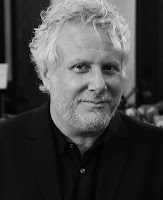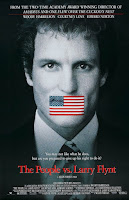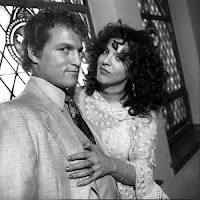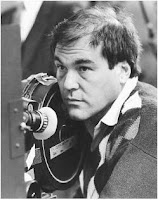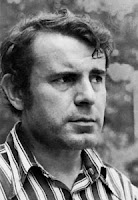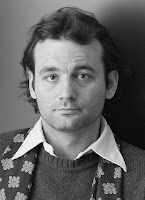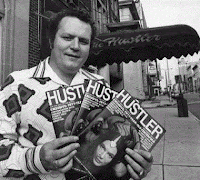Larry Karaszewski and Scott Alexander scored a huge success as the writers of PROBLEM CHILD (1989) and PROBLEM CHILD 2 (1990), but fearing being pigenholed, they changed track and wrote ED WOOD (1994), which was filmed by Tim Burton. The film was the first of a series of projects that looked at the lives of dysfunctional, troubled and brilliant creative people (Larry Flynt in THE PEOPLE VS. LARRY FLYNT, Andy Kaufman in MAN ON THE MOON, Margaret Keane in BIG EYES, O.J. Simpson in the current TV series AMERICAN CRIME STORY: THE PEOPLE VS. O.J. SIMPSON, and Bob Crane in AUTO FOCUS, which they produced). These people are distinguished by their charm, drive and the outlandish events they became part of. The writers tell their stories with humour, pace, a strong dramatic sense and a great deal of warmth and empathy. I spoke to Larry about the making of THE PEOPLE VS. LARRY FLYNT (1996), a film that dramatises the incredible life of Larry Flynt (Woody Harrelson),
owner of the Hustler Magazine porn empire and a man who not only
endured amazing highs and lows in his personal life but ended up a key defender of every American person's right to free speech. The film won Larry and Scott the Golden Globe for Best Screenplay. In part two we discuss the evolution of the script, the time Larry and Scott spent with the real Larry Flynt, the casting of the movie, working with Milos Forman, and the film's legacy.
Part 1.
Part 1.
How
did the screenplay change after you thought Oliver Stone was going
to direct and then Milos Forman came on board?
I don't think it really changed much at all. Not to be egotistical at all, but there's a certain Scott and Larry tone that is hard for us to shake whoever is directing the movie. At the end of the day, Milos was very sympatico to that tone. Oliver gave us permission to get into the politics and cover the court cases, but we weren't tailoring it for him. When Milos came onboard, there were some small changes, as there would be whenever any filmmaker came onboard. In an earlier draft there was a character who was very important in Larry's life, a radical black comedian of the 60s named Dick Gregory, whom Larry had taken in. Larry had money, so he had all these intelligent lefties hanging out with him who taught him about the political theater that he adopted. Gregory was an important part of that. Milos wanted us to eliminate that character because he wanted Larry to come up with everything on his own. He saw Larry as this backwoods guy who figured it all out. Which is really who he was. In our script we had had Gregory as this sidekick guy who was telling Larry what he should be doing and in effect it was creating a distance between the audience and Larry, when it was meant to be Larry moving the story forward.
We also had a couple of fantasy elements that got changed. I am very happy with the film but the section I am least happy with is the Born Again Christian section. Originally we had Larry telling everyone that he had had a vision of Jesus and that Lenny Bruce had come to him. It was a really psychedelic 'Come to Jesus' moment and we had played it that way. It took place in Heaven. Milos is a very naturalistic filmmaker and he said ''How do I film Heaven?'' That section of the film kept on getting whittled away and now in the film Larry's Christian conversion is a bit of an enigma. It was a much bigger thing in our script. Larry really did see Jesus, and was seriously trying to work out some kind of combination of religion and porn in his life.
How many drafts of the screenplay did you do?
The initial draft was 170 pages long, and we got it down to 150 before we went out to directors. When Milos came on board we got it into the 120s. We kept doing drafts to try and get it into a reasonable running time.
You had a series of meetings with the real Larry Flynt. How did he live up to your preconceptions of him?
We set up the project without him. When we had the meeting with Columbia Pictures, they had asked if they needed to get the rights from Larry. Funnily enough, we didn't have to because there was a Supreme Court decision called Jerry Falwell vs Larry Flynt which gave us the right to say what we wanted about a public figure. Larry's court case was the court case that would keep him from suing us if we made a movie about his life without his permission. At that time we really didn't want Larry's permission as we didn't want it to be an authorised biopic. At a certain point, when Larry heard the movie was being made, he started waving his hands and didn't want the train to leave the station without him. He was willing to be very cooperative, and the legal team at Columbia said ''Hey, this would be very convenient for us because there are certain legal question marks about things like whether you can show the Hustler logo or show Larry's signature on a piece of paper.'' Larry was extremely helpful, and I found him to be a very interesting man. I liked him.
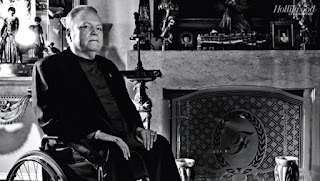 When
the movie came out, it created a little bit of a problem for us in
that Larry went on a national tour. Instead of audiences seeing Woody
Harrelson, Courtney Love and Edward Norton on Larry King or The
Tonight Show promoting the film, they saw the real Larry Flynt. It
gave the impression that we were all in bed with Larry Flynt, which
of course wasn't true. People even asked me if Larry had paid for the
film. I understand that a movie was made about his life, and a lot of
people asked him to show up on TV, so he showed up. He had always
been a constant figure on talk shows and on the Hollywood party
circuit. The film opened to insanely great reviews and had a buzz
around it, but by the time it went wide there was a bit of a backlash
asking why Hollywood was making a film about a smut peddler that was
constantly on TV talk shows. I wish Larry had done his victory lap
when the film came on video, but hindsight is always 20/ 20.
When
the movie came out, it created a little bit of a problem for us in
that Larry went on a national tour. Instead of audiences seeing Woody
Harrelson, Courtney Love and Edward Norton on Larry King or The
Tonight Show promoting the film, they saw the real Larry Flynt. It
gave the impression that we were all in bed with Larry Flynt, which
of course wasn't true. People even asked me if Larry had paid for the
film. I understand that a movie was made about his life, and a lot of
people asked him to show up on TV, so he showed up. He had always
been a constant figure on talk shows and on the Hollywood party
circuit. The film opened to insanely great reviews and had a buzz
around it, but by the time it went wide there was a bit of a backlash
asking why Hollywood was making a film about a smut peddler that was
constantly on TV talk shows. I wish Larry had done his victory lap
when the film came on video, but hindsight is always 20/ 20.
What was discussed in your meetings with him?
When he came on board we had a couple of meetings with him because we wanted everything as authentic as possible. We were very nervous at first that he was going to try and make us change things, but as we went through it was great because he would leave the big picture alone. It would be tiny little specific details that he would fixate on, like ''I never served this kind of food at the Hustler Club.'' We had him in an electric wheelchair in several scenes, but he told us he never had one. He added all these realistic details to the script that made the script more authentic. Alan Isaacman felt that Larry was a manic depressive and that a lot of his behaviour in court was because of his bi-polar condition. Alan really wanted us to address this in the script. Larry could see we were resisting this, and he told Alan ''Look, they don't want to give me an excuse.'' And he was right. We wanted his behaviour to come from his inner character. Eventually we had one throwaway line that Alan Isaacman has where Alan tries to explain Larry's behaviour to the court and he tells them he's an undiagnosed manic depressive.
How does the real Larry Flynt compare to Woody Harrelson's version?
I don't think it really changed much at all. Not to be egotistical at all, but there's a certain Scott and Larry tone that is hard for us to shake whoever is directing the movie. At the end of the day, Milos was very sympatico to that tone. Oliver gave us permission to get into the politics and cover the court cases, but we weren't tailoring it for him. When Milos came onboard, there were some small changes, as there would be whenever any filmmaker came onboard. In an earlier draft there was a character who was very important in Larry's life, a radical black comedian of the 60s named Dick Gregory, whom Larry had taken in. Larry had money, so he had all these intelligent lefties hanging out with him who taught him about the political theater that he adopted. Gregory was an important part of that. Milos wanted us to eliminate that character because he wanted Larry to come up with everything on his own. He saw Larry as this backwoods guy who figured it all out. Which is really who he was. In our script we had had Gregory as this sidekick guy who was telling Larry what he should be doing and in effect it was creating a distance between the audience and Larry, when it was meant to be Larry moving the story forward.
We also had a couple of fantasy elements that got changed. I am very happy with the film but the section I am least happy with is the Born Again Christian section. Originally we had Larry telling everyone that he had had a vision of Jesus and that Lenny Bruce had come to him. It was a really psychedelic 'Come to Jesus' moment and we had played it that way. It took place in Heaven. Milos is a very naturalistic filmmaker and he said ''How do I film Heaven?'' That section of the film kept on getting whittled away and now in the film Larry's Christian conversion is a bit of an enigma. It was a much bigger thing in our script. Larry really did see Jesus, and was seriously trying to work out some kind of combination of religion and porn in his life.
How many drafts of the screenplay did you do?
The initial draft was 170 pages long, and we got it down to 150 before we went out to directors. When Milos came on board we got it into the 120s. We kept doing drafts to try and get it into a reasonable running time.
You had a series of meetings with the real Larry Flynt. How did he live up to your preconceptions of him?
We set up the project without him. When we had the meeting with Columbia Pictures, they had asked if they needed to get the rights from Larry. Funnily enough, we didn't have to because there was a Supreme Court decision called Jerry Falwell vs Larry Flynt which gave us the right to say what we wanted about a public figure. Larry's court case was the court case that would keep him from suing us if we made a movie about his life without his permission. At that time we really didn't want Larry's permission as we didn't want it to be an authorised biopic. At a certain point, when Larry heard the movie was being made, he started waving his hands and didn't want the train to leave the station without him. He was willing to be very cooperative, and the legal team at Columbia said ''Hey, this would be very convenient for us because there are certain legal question marks about things like whether you can show the Hustler logo or show Larry's signature on a piece of paper.'' Larry was extremely helpful, and I found him to be a very interesting man. I liked him.
 When
the movie came out, it created a little bit of a problem for us in
that Larry went on a national tour. Instead of audiences seeing Woody
Harrelson, Courtney Love and Edward Norton on Larry King or The
Tonight Show promoting the film, they saw the real Larry Flynt. It
gave the impression that we were all in bed with Larry Flynt, which
of course wasn't true. People even asked me if Larry had paid for the
film. I understand that a movie was made about his life, and a lot of
people asked him to show up on TV, so he showed up. He had always
been a constant figure on talk shows and on the Hollywood party
circuit. The film opened to insanely great reviews and had a buzz
around it, but by the time it went wide there was a bit of a backlash
asking why Hollywood was making a film about a smut peddler that was
constantly on TV talk shows. I wish Larry had done his victory lap
when the film came on video, but hindsight is always 20/ 20.
When
the movie came out, it created a little bit of a problem for us in
that Larry went on a national tour. Instead of audiences seeing Woody
Harrelson, Courtney Love and Edward Norton on Larry King or The
Tonight Show promoting the film, they saw the real Larry Flynt. It
gave the impression that we were all in bed with Larry Flynt, which
of course wasn't true. People even asked me if Larry had paid for the
film. I understand that a movie was made about his life, and a lot of
people asked him to show up on TV, so he showed up. He had always
been a constant figure on talk shows and on the Hollywood party
circuit. The film opened to insanely great reviews and had a buzz
around it, but by the time it went wide there was a bit of a backlash
asking why Hollywood was making a film about a smut peddler that was
constantly on TV talk shows. I wish Larry had done his victory lap
when the film came on video, but hindsight is always 20/ 20. What was discussed in your meetings with him?
When he came on board we had a couple of meetings with him because we wanted everything as authentic as possible. We were very nervous at first that he was going to try and make us change things, but as we went through it was great because he would leave the big picture alone. It would be tiny little specific details that he would fixate on, like ''I never served this kind of food at the Hustler Club.'' We had him in an electric wheelchair in several scenes, but he told us he never had one. He added all these realistic details to the script that made the script more authentic. Alan Isaacman felt that Larry was a manic depressive and that a lot of his behaviour in court was because of his bi-polar condition. Alan really wanted us to address this in the script. Larry could see we were resisting this, and he told Alan ''Look, they don't want to give me an excuse.'' And he was right. We wanted his behaviour to come from his inner character. Eventually we had one throwaway line that Alan Isaacman has where Alan tries to explain Larry's behaviour to the court and he tells them he's an undiagnosed manic depressive.
How does the real Larry Flynt compare to Woody Harrelson's version?
They're
very similar. Woody did a great job. He's obviously more movie star
handsome and perhaps more charismatic. Larry has been through a lot,
and he goes through intense periods of pain and medication. There
have been quite a few times where he has been near death. When he's
'on', he's very funny, very witty and a rascal. He's also very smart,
and knows what's going on. Some people might say that we were
glorifying him by having Woody Harrelson play him, but at the end of
the day, Larry Flynt is a very amusing man. You can hate him for what
he does or what he believes, but he does have a twinkle in his eye.
Were
you on set a lot?
Most of it was shot down in Memphis, and we were there for a while. Memphis had areas where urban renewal hadn't happened yet so we actually had streets that actually still looked like 1970s. When the film moved to Los Angeles we were on set every day. It was a friendly set. Milos is a very giving director and is very open to outside input. He likes having writers around and having actors invent stuff. He wants the best people around him and for them to be creative. He's not a dictator as a director. Milos very much has his own way of making a movie and puts his own stamp on it, and makes the final decision on everything. He's definitely an auteur, but he is not intimidated by having other creative people around him. That's what makes him and his films very special.
Did you continue to revise the script on set?
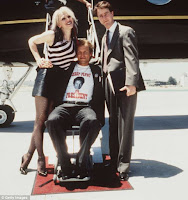 Not
so much. We made a few changes in Memphis, but for the most part, the
screenplay just came alive. It was a bit different than on ED WOOD
where Tim shot our script word for word. Both are great actor's
directors, but Milos encouraged more improvisation. It was always
within the context of the scene. Actors would ask Milos how to play
a scene and he would say ''Why are you asking me? You are the
character now. '' He likes to find actors who are so right for the
part that even their mistakes are correct. He also likes to cast real
people as much as he can for the authenticity that they bring. That's
why he cast Woody Harrelson's real brother Brett as Larry Flynt's
brother.
Not
so much. We made a few changes in Memphis, but for the most part, the
screenplay just came alive. It was a bit different than on ED WOOD
where Tim shot our script word for word. Both are great actor's
directors, but Milos encouraged more improvisation. It was always
within the context of the scene. Actors would ask Milos how to play
a scene and he would say ''Why are you asking me? You are the
character now. '' He likes to find actors who are so right for the
part that even their mistakes are correct. He also likes to cast real
people as much as he can for the authenticity that they bring. That's
why he cast Woody Harrelson's real brother Brett as Larry Flynt's
brother.
Were you involved with the casting decisions?
Most of it was shot down in Memphis, and we were there for a while. Memphis had areas where urban renewal hadn't happened yet so we actually had streets that actually still looked like 1970s. When the film moved to Los Angeles we were on set every day. It was a friendly set. Milos is a very giving director and is very open to outside input. He likes having writers around and having actors invent stuff. He wants the best people around him and for them to be creative. He's not a dictator as a director. Milos very much has his own way of making a movie and puts his own stamp on it, and makes the final decision on everything. He's definitely an auteur, but he is not intimidated by having other creative people around him. That's what makes him and his films very special.
Did you continue to revise the script on set?
 Not
so much. We made a few changes in Memphis, but for the most part, the
screenplay just came alive. It was a bit different than on ED WOOD
where Tim shot our script word for word. Both are great actor's
directors, but Milos encouraged more improvisation. It was always
within the context of the scene. Actors would ask Milos how to play
a scene and he would say ''Why are you asking me? You are the
character now. '' He likes to find actors who are so right for the
part that even their mistakes are correct. He also likes to cast real
people as much as he can for the authenticity that they bring. That's
why he cast Woody Harrelson's real brother Brett as Larry Flynt's
brother.
Not
so much. We made a few changes in Memphis, but for the most part, the
screenplay just came alive. It was a bit different than on ED WOOD
where Tim shot our script word for word. Both are great actor's
directors, but Milos encouraged more improvisation. It was always
within the context of the scene. Actors would ask Milos how to play
a scene and he would say ''Why are you asking me? You are the
character now. '' He likes to find actors who are so right for the
part that even their mistakes are correct. He also likes to cast real
people as much as he can for the authenticity that they bring. That's
why he cast Woody Harrelson's real brother Brett as Larry Flynt's
brother. Were you involved with the casting decisions?
Yes,
we were consulted. The casting director was Francine Maisler, who is
one of the best at what she does. It was a very fun movie to cast
because of the non-actors Milos chose to cast. It was the time of the
OJ trial, and there was a lawyer on Court TV who was giving
commentary. We ended up hiring him to play a lawyer in our movie.
Milos cast a very famous Judge in Memphis, D'Army Bailey, as one of
the Judges. He cast Larry as a Judge too. It was exciting.
As for the main cast, Woody was cast almost instantly. We looked at a lot of older and younger actors to play Alan Isaacman, but we fell in love with Edward Norton. The big hurdle was Courtney Love, who had not made a movie before. It was the peak of her fame, but she had had issues in her past that made getting her insured to do the movie almost impossible. Milos wanted to cast her and we all thought it was a fantastic idea, but the studio really encouraged him to cast someone else. There was a long drawn-out process where he saw a lot of different actresses but ultimately he wanted Courtney. Milos, Oliver, producer Michael Hausman and Woody ended putting up their salaries as a bond to make sure she could be in the film.
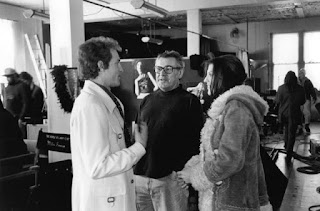 Was
Oliver Stone gung-ho for Woody to do it after NATURAL BORN KILLERS (1994)?
Was
Oliver Stone gung-ho for Woody to do it after NATURAL BORN KILLERS (1994)?
As for the main cast, Woody was cast almost instantly. We looked at a lot of older and younger actors to play Alan Isaacman, but we fell in love with Edward Norton. The big hurdle was Courtney Love, who had not made a movie before. It was the peak of her fame, but she had had issues in her past that made getting her insured to do the movie almost impossible. Milos wanted to cast her and we all thought it was a fantastic idea, but the studio really encouraged him to cast someone else. There was a long drawn-out process where he saw a lot of different actresses but ultimately he wanted Courtney. Milos, Oliver, producer Michael Hausman and Woody ended putting up their salaries as a bond to make sure she could be in the film.
 Was
Oliver Stone gung-ho for Woody to do it after NATURAL BORN KILLERS (1994)?
Was
Oliver Stone gung-ho for Woody to do it after NATURAL BORN KILLERS (1994)?
Yes,
he was, but the initial idea came from the studio. Woody had made a
film called MONEY TRAIN (1995) for Columbia. Milos saw the film but he
didn't care much for it. But when he spoke to Woody, he got why he'd
be perfect. It was very easy to see him in that part, perhaps even
more so than Bill Murray. The way his mind worked was very sympatico
to the character that we wrote.
Did Ed Norton get cast on the strength of his audition tape for PRIMAL FEAR (1996)?
Did Ed Norton get cast on the strength of his audition tape for PRIMAL FEAR (1996)?
Yes,
that was it. Ed was cast in our movie before any of his films had
come out. What happens in Hollywood sometimes is that someone becomes
the hottest actor in town and no-one in the middle of America knows
who this person is. These people can be harder to get in your movie
than if you were going after a gigantic star. An example would be
when Tom Hardy and Michael Fassbender first broke out.
How was working with Crispin Glover?
How was working with Crispin Glover?
Crispin
wanted to have a disfigured eye in the film, but no-one could
understand why he wanted to do that. It turned out it was because
there was a scene in the film where he walks into a Hustler
photoshoot and Althea is doing her nude spread. He's talking to
Althea and he doesn't know it's her until mid-scene. As an actor,
Crispin didn't understand why his character wouldn't know it was
Althea, so he decided his character needed to have a defect in one
eye, which would explain why he didn't notice her at first.
Is it true the rough cut was three hours long?
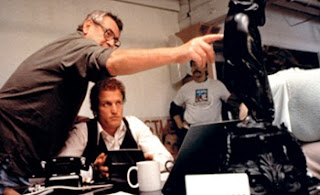 I
can't remember if it was that long. There was a whole section where
Larry ran for President that got taken out. That cut certainly had
more breathing space, but it was a little too languid. The film was
improved by leaving the extra footage out, and it became more
energetic, as it needed to be.
I
can't remember if it was that long. There was a whole section where
Larry ran for President that got taken out. That cut certainly had
more breathing space, but it was a little too languid. The film was
improved by leaving the extra footage out, and it became more
energetic, as it needed to be.
Is it true the rough cut was three hours long?
 I
can't remember if it was that long. There was a whole section where
Larry ran for President that got taken out. That cut certainly had
more breathing space, but it was a little too languid. The film was
improved by leaving the extra footage out, and it became more
energetic, as it needed to be.
I
can't remember if it was that long. There was a whole section where
Larry ran for President that got taken out. That cut certainly had
more breathing space, but it was a little too languid. The film was
improved by leaving the extra footage out, and it became more
energetic, as it needed to be. How did it feel to win the Golden Globe for Best Screenplay?
It was very satisfying, especially because it was during a time when the film was getting this weird backlash. It was a nice vindication for the work we did. We never expected to win. Milos won too, which was terrific. The Globes have always been sympathetic to the work Scott and I do.
Were you worried at all about the balance of comedy and drama working?
When
you have someone like Milos directing, you don't worry. Milos has no
problem with a joke in the middle of a serious scene, or a serious
moment in the middle of a funny scene, because that's what life
really is. Sad things happen when you're happy, and you can have a
good laugh at a funeral. I'm never worried what section of the video
store a film we're writing is going to go in, but many mainstream
films always have to be one thing. I was worried whether audiences
would get the film, but the film premiered at the New York Film
Festival, and the reception was so positive that I knew we were in
good shape critically. I had seen the movie enough times that I knew
it played well with audiences. We are all very happy with the film we
made, and it has had a great afterlife. One of the reviews I'm most
proudest of was the original Variety review where was the film was
favourably compared to 70s era films. The critic got what we were
going for.
I spoke to Larry by telephone on 28th August 2012 and would like to thank him for his time.
Larry on ED WOOD.
Larry and Scott Alexander on BIG EYES.
I spoke to Larry by telephone on 28th August 2012 and would like to thank him for his time.
Larry on ED WOOD.
Larry and Scott Alexander on BIG EYES.
Interview by Paul Rowlands. Copyright © Paul Rowlands, 2016. All rights reserved.
